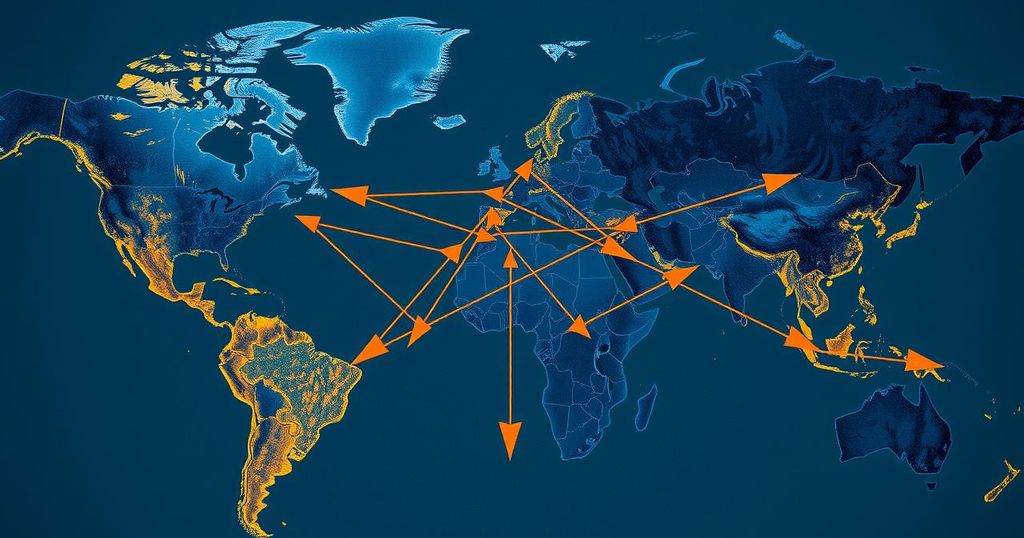Politics
’ S PEOPLE ’ S LIBERATION ARMY, CHINA CYBERSECURITY INDUSTRY ALLIANCE, CIA, DEFENSE, DONALD TRUMP, EUROPE, EUROPE/ASIA, GEOPOLITICS, GUO, JOHN RATCLIFFE, MILITARY, NORTH AMERICA, NUCLEAR WEAPONS, PEOPLE ’ S LIBERATION ARMY, PLA, RUSSIA, TU, TULSI GABBARD, UKRAINE, UNITED STATES, US, US-CHINA RELATIONS
Sophia Klein
China Declared Predominant Military and Cyber Threat to United States
China is identified as the primary military and cyber threat to the United States, with reports of advancements in military capabilities aimed at Taiwan and expansive goals in artificial intelligence. Tensions with the U.S. are exacerbated by issues such as the fentanyl crisis. Additionally, significant domestic challenges could undermine China’s stability and progress.
According to a report by U.S. intelligence agencies, China is identified as the foremost military and cyber threat to the United States. The report indicates that China is making methodical yet inconsistent progress on capabilities that may be utilized to take control of Taiwan. Additionally, China possesses the capability to use conventional weapons against the U.S., conduct cyber-attacks on its infrastructure, and target U.S. assets in space. Moreover, Beijing aims to surpass the United States as the leading power in artificial intelligence by 2030.
The report, issued prior to testimony from former intelligence officials before the Senate, highlights the strategic challenges posed by China alongside Russia, Iran, and North Korea. Notably, the ongoing war in Ukraine has provided Russia with practical insights concerning combat with Western armaments and intelligence in large-scale conflicts.
The intelligence community’s report reveals that the Chinese People’s Liberation Army (PLA) is likely planning to exploit large language models for disinformation, impersonation, and establishment of attack networks. Tulsi Gabbard, the Director of National Intelligence, described China’s military operations as increasingly advanced, featuring hypersonic weapons, stealth aircraft, and more robust cyberwarfare capabilities.
The report’s timing corresponds with a claim by the China Cybersecurity Industry Alliance, which criticized U.S. intelligence agencies for extensive and prolonged hacking of phone and online networks. Guo Jiakun, a spokesperson for the Chinese Foreign Ministry, expressed deep concern, alleging that the U.S. manipulates security issues while engaging in its own covert activities.
Additionally, CIA Director John Ratcliffe informed the Senate committee regarding China’s inconsistent measures to impede the flow of fentanyl precursor chemicals linked to the ongoing crisis in the U.S. Tensions have increased due to former President Trump’s implementation of tariffs to penalize China for its perceived inaction regarding these chemicals. Ratcliffe asserted that there were no substantial obstacles preventing China from addressing this issue.
China’s embassy spokesperson, Liu Pengyu, contended that the U.S. exaggerates the Chinese threat to justify its military dominance and asserted China’s commitment to global peace and security. He further emphasized that fentanyl abuse is primarily an American issue that needs resolution.
The committee discussion was dominated by concerns regarding China, with about one-third of the report dedicated to Beijing’s increasing military and economic pressures on Taiwan, which China considers its territory. The report also details the PLA’s gradual development of capabilities for a potential seizure of Taiwan, while acknowledging the serious domestic issues China faces, potentially undermining the legitimacy of the ruling Communist Party as economic growth continues to slow.
In summary, the Annual Threat Assessment underscores China as the leading military and cyber threat to the United States, with ongoing advancements in military capabilities and ambitions in artificial intelligence. The report also highlights Beijing’s strategic maneuvers concerning Taiwan and its complex domestic challenges. Additionally, U.S.-China relations remain strained due to issues such as the fentanyl crisis, showcasing the multifaceted nature of this ongoing geopolitical rivalry.
Original Source: www.theguardian.com








Post Comment